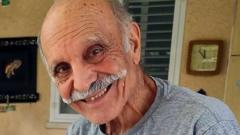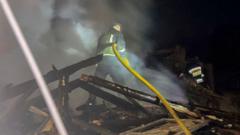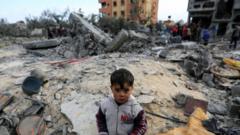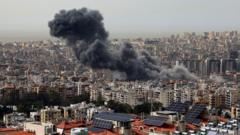The Israeli military has announced the death of 86-year-old Shlomo Mansour, who was taken hostage by Hamas during the October 7 attack. His identity as a victim adds to the complexities of the current hostage crisis, in which multiple prisoners remain caught amid escalating tensions between Israel and Hamas.
Israeli Military Confirms Death of Elderly Hostage in Hamas Attack

Israeli Military Confirms Death of Elderly Hostage in Hamas Attack
Shlomo Mansour, an 86-year-old man abducted by Hamas, was confirmed dead during the October 7 attack, exacerbating the ongoing tension around hostage negotiations.
The Israeli military has tragically confirmed the death of Shlomo Mansour, an 86-year-old man who was taken hostage during Hamas's brutal attack on October 7, 2023. Mansour was abducted from his home in Kibbutz Kissufim, and while his wife, Mazal, managed to escape, he was not so fortunate. His remains are reportedly being held captive by Hamas in Gaza.
The decision to officially acknowledge Mansour's death came after months of intelligence gathering and has been confirmed by a health ministry committee. His name was included on a list of 33 hostages slated for potential release as part of a fragile ceasefire agreement, which is increasingly under threat due to escalating tensions.
Since January 19, 2023, Hamas has confronted Israel with a staggering hostage situation. Though 16 living Israeli hostages have been released in exchange for hundreds of Palestinian prisoners, the issue remains unresolved, with another 17 Israeli hostages still in captivity. This cohort includes two children and other individuals of various ages. Notably, both sides allege that eight hostages have died, although they have not been named.
Compounding these distressing developments, Hamas has issued warnings about postponing the planned release of three hostages unless apparent violations of the ceasefire deal are addressed—claims that Israel strongly denies. U.S. President Donald Trump has weighed in on the crisis, suggesting a hardline stance that would abandon these negotiations altogether.
Shlomo Mansour's roots trace back to Baghdad, where he experienced the harrowing Farhud pogrom against the Jewish community in 1941 before moving to Israel at 13 and helping to establish Kibbutz Kissufim. During the infamous attack by Hamas on October 7, gunmen stormed their home, leading to the tragic events resulting in his death. After surviving the attack, the family received word from the Israeli military about the elder Mansour’s demise and the retrieval of his body by Hamas.
Israeli leadership, led by Prime Minister Benjamin Netanyahu, has expressed profound condolences to the Mansour family and pledged relentless efforts to secure the return of both living and deceased hostages. Advocacy groups representing the families of hostages have echoed this sentiment, underlining the urgent nature of the situation. They are increasingly urging mediators to enforce compliance with the ceasefire as recent releases of hostages showcased alarming signs of neglect and harsh conditions endured during their captivity.
While the conflict in Gaza continues to escalate, with over 48,200 casualties reported since the Israeli military operation against Hamas commenced, efforts to bring all hostages home remain a pressing concern amid a complex web of political maneuvering and humanitarian crises. The Mansour family’s grief reflects the broader anguish felt by many in Israel as hopes for resolution wane.


















